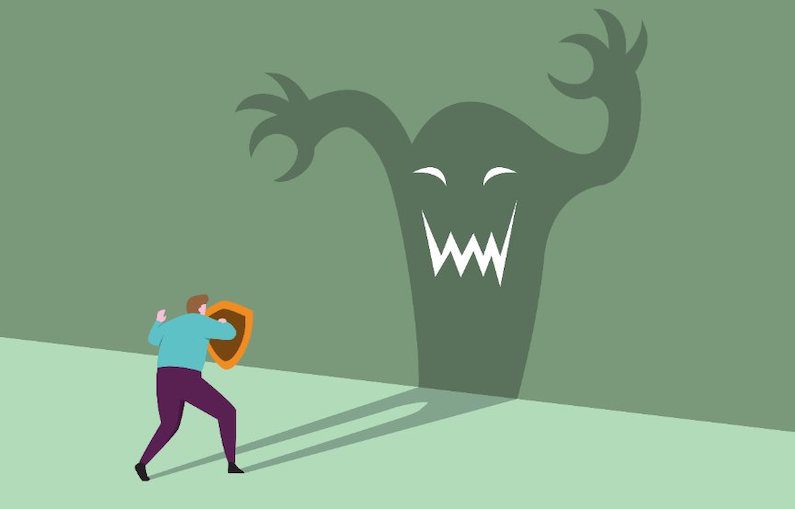There’s a big thing to be done. You contemplate the big thing, and Big Thing stares right back – it ain’t budgin’. This town isn’t big enough for the both of you. Meet Big Thing in front of the saloon at high noon. Or, arrange a quest to go out and find it and slay it – in the process, you plan, scheme, worry, research…and worry some more. And wait.
But in all instances, at all costs, you work yourself into a complete frenzy over Big Thing, because that’s the only way to overcome it, right?
Have you noticed in many of the “conquering hero” type stories, the antagonist turns out to be less fearsome than everyone thinks? The scary mask comes off, and there’s just an injured, old man behind it. The wicked witch goes down with nothing more than a little girl and a bucket of water. Those meddling kids and their dog pull the bandages off the mummy – and he’s nothing but a greedy archeologist.
Velma is not having it.
The mild-mannered heroes in our modern fairy tales bravely confront the thing that threatens, and save the day. Of course, those are stories. But the fairy tale archetype is based on an age-old truth – openness, bravery, and action (and maybe a little magic) often win the day.
But I don’t know that it takes bravery – or even magic – to manage your Big Thing.
I know what it doesn’t have to take – it’s something sometimes my clients and I refer to as “pre-catastrophizing,” which, as I did some research for this post, I discovered is a redundancy. Noted psychologist Albert Ellis coined the term “catastrophizing,” which is, by his definition:
“an irrationally negative forecast of future events.”
The “pre” isn’t necessary, so technically we’re forecasting a negative forecast (which may also be happening)…but you get what I mean.
Why we indulge in catastrophizing is still up for debate. Forewarned is forearmed, maybe (even if imaginary)? In my experience, I suppose it’s a coping mechanism. If I can fully conjure up all the worst-case scenarios in the most extraordinary detail, then perhaps I’ll be totally prepared and can weather any possible disappointment. My story will cover all the horrible bases.
The problem is, these fictional scenarios start feeling very real, like they’re actually happening. You stress out about your upcoming presentation and make all sorts of assumptions about how much time it will take, how little you have to say, how bored the audience will be. Maybe people will even get up and leave in the middle of it. Spin the tale, spin the tale, postpone, postpone.
But when you finally manage to open up PowerPoint and type something (anything) into the first slide, it only takes about an hour to pull it together – because you do actually know what you’re talking about. When you step up to the mic, everyone is friendly and receptive. You have tons of people interested in who you are and what you do.
All that rumination energy that sucked the life out of you, was pretty much wasted. Not only that, studies show that catastrophizing is linked to depression and increased fatigue. There’s a physical toll.
There’s another problem, too: spin the tales as you like, but there is no way to predict every possible negative outcome. Say you contemplate reorganizing your craft space. It weighs on you because it doubles as a guest room, and your favorite cousin is coming for a visit in 10 days. That craft room is a disaster area – it’s full of material and canvases and hot glue gun supplies and ribbon, and at least five unopened bags from Michael’s. You haven’t seen the surface of the bed in months. What’s she going to think?
You’re super-stressed that it will take forever, and you don’t have space for everything. You’ll have to stash away at least four projects-in-progress, which will mess everything up. For good measure, you throw in some guilt over not finishing said projects. Not to mention your cousin is probably going to show up and be disappointed that the sheets are only 200 thread count, and you don’t even have the decency to own a cappuccino machine. You delay. You spin. You tell yourself the stories. Finally, the day before she’s due to arrive, you stay up all night cleaning and purging – only to have her call that morning to let you know she has COVID*, and has to postpone.
I mean, I guess now you have a clean guest room, but at what cost to your sleep and emotional wellbeing?
The good news is, those unlikely heroes of fairy tales and myths have some other things going for them that we can take to heart – among them patience, acceptance, and perhaps best of all, a childlike curiosity. They don’t pause too long to calculate before they take action, whether climbing a beanstalk or pulling back the curtain on a wizard. There’s an open sense of “I wonder what will happen if I do this thing…?” as opposed to “Oh my God, if I do this thing then…”
So – I wonder what might happen if you squared off with your Big Thing? I wonder how it would be to change the narrative, kickstart the process, plant the seeds? If you could shift that excellent imagination from a horror story to, say, maybe a slightly offbeat Hallmark movie, what could you accomplish?
Would it be kind of cool to find out?
*In the interest of happy endings…your cousin’s case was mild, and she was able to reschedule her flight to a month later. And it turns out, she doesn’t even like coffee.






Yes, it is worth finding out for sure!
I think the key takeaway for me is how much energy we waste on catastrophizing. It isn’t just neutral, its definitely a negative. And so often, we can look back and see that all the things we worried and ruminated about didn’t end up being the hard stuff after all. Often the biggest challenges are things we didn’t see coming at all (Hello, COVID!).
It’s so hard to break out of our heads and take action, but I find it usually does begin to decompress us even if we just take one tiny step. Turn that mental narrative around, right?
Yes, you’d think we all would have learned that we can’t always accurately predict things – but humans are stubborn that way. We like to think we can know outcomes, I guess. Taking action is the key, for sure, and sometimes it can be as brief as standing up, or walking in a room, or opening a notebook. Thanks for the comment, Seana.
Oh, Sara. I love how you explained all the ways in which we (I am including myself in this) catastrophize. My mother used to call it ‘making mountains out of molehills). Spinning, churning, staying up worrying absolutely sucks the energy right out of us. I don’t think it’s wrong to wonder about the worst thing that could happen. I think it’s ok to ponder that question and then move on and do it anyway. It’s the dwelling in the wondering that makes the problem worse. I say look at the pros and cons, think about the best next step, and take it.
I like that idea – considering the worst and moving on regardless. Because sometimes people also make up the BEST-case scenario, and then they feel loss or shame when they fall short. Balance is key, isn’t it? Appreciate you stopping by, Diane.
I love the term catastrophizing. It’s something we all do to some extent or another. The older I get the less I tend to do it.
when something lurks out there, I may ask myself, “What is the worst thing that could happen?” Then I think of how I would deal with that, knowing that it is most likely not going to be that bad. Then I move on.
Hmmm. Sometimes I think I’m worse as I get older. I guess it depends on the Big Thing in question. I’ve had some sleepless nights recently over something I really don’t have control over – but I do come back to the understanding that I CAN do and have control over small things. It might be a matter of divvying up the Big Thing into smaller chunks, making it less daunting. It’s great that you can take a more measured approach, Jonda.
Sara- I love this post! It spoke to me on many levels. I absolutely recognize many clients here and how the BIG THING can be a major barrier to entry. But I also see it for myself and the mind games I can play with negatively anticipating or psyching myself out of doing that “thing.” It’s not always the case for me. Generally, I approach things in a curious, positive way.
But I’m human and there are times when I get in my own way. So I’m going to take your advice to heart and work on changing the narrative. Thank you for the boost. Needed to hear this one.
You always strike me as so positive, Linda – but it’s very true that we all get into our own messy way at times. Catastrophizing is easier to do than I’d like to admit, but maybe that helps me empathize with clients when they fall into it as well. Thank you for the comment and kind words.
It made me anxious just reading about catastrophizing! (And brought several current projects to mind.) I wouldn’t say I mostly think that way, but often enough to need a good reality check once in awhile. So, thanks for that, Sara!
Oof, I’m sorry it made you anxious, Hazel! I hope that the reality check was supportive to you – thank you for stopping by!
First, I love, love, love how you present things. All your fairy tales and Big Bads need to be a book.
Second, I have done battle with my own catastrophizing over time, and have learned that taking it to the absolute maximum, “OK, if this horrible thing happens, THEN WHAT?” questioning it until it gets more and more ridiculous until someone gets eaten by a tree or catapulted into the sun; it’s impossible to fear the ridiculous.
This reminded me of the “Fear, Itself” episode of Buffy the Vampire Slayer. In fighting the episode’s “Big Bad,” every character experiences his or her own anticipated fear. But in the end, after all the pre-fighting, they’re at the cusp and Buffy destroys the symbol of the Big Bad before Giles can tell her that destroying the symbol is going to bring this evil dude into existence. But when the demon manifests, it ends up that he’s only a few inches tall. Buffy just squished him with her shoe! Later, Giles realizes the little drawing of the Big Bad in the book had a Gaelic inscription reading: “Actual size.”
Thank you for reminding us that fear is only useful up to the point that it prepares us for doing battle, but no further. I may worry I’ll miss my flight, so I’ll do everything to prepare to be on time, even if that means I’m a little bored at the airport. But I won’t fear the flight itself, because it’s out of my hands. There’s a quote from the Talmud, “The sun will set without thy assistance,” that I use to remind me that my worrying about things I can’t control is a waste of my energy and skills, and won’t really affect the outcome of anything. We must all follow your advice to change the narrative!
Your “absolute maximum” reminds me of something described in “Embracing Fear” by Thom Rutledge – it’s called the Ladder of Fear. You keep asking “what’s the worst thing that could happen if?”, “and THEN what’s the worst thing that could happen,” “and THEN…” and so on, like you’re going down the rungs of a ladder. It helps you get to the root of what your anxiety is really about, which is sometimes not what we originally thought it was about. It’s a good exercise if you can step back from your situation a little bit. Love the Talmud quote – very wise to consider. Thanks so much for your thoughtful comment, Julie!